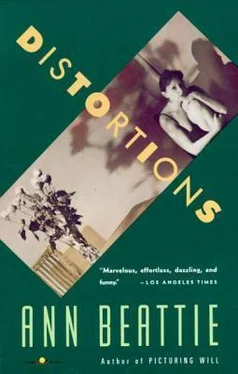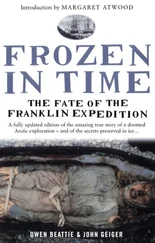“Are you happy?” MacDonald says. “Because if you’re happy I’ll leave you alone.”
MacDonald is sitting in a small gray chair, patterned with grayer leaves, talking to his brother, who is standing in a blue chair. MacDonald’s brother is four feet, six and three-quarter inches tall, and when he stands in a chair he can look down on MacDonald. MacDonald is twenty-eight years old. His brother, James, is thirty-eight. There was a brother between them, Clem, who died of a rare disease in Panama. There was a sister also, Amy, who flew to Panama to be with her dying brother. She died in the same hospital, one month later, of the same disease. None of the family went to the funeral. Today MacDonald, at his mother’s request, is visiting James to find out if he is happy. Of course James is not, but standing on the chair helps, and the twenty-dollar bill that MacDonald slipped into his tiny hand helps too.
“What do you want to live in a dwarf house for?”
“There’s a giant here.”
“Well it must just depress the hell out of the giant.”
“He’s pretty happy.”
“Are you?”
“I’m as happy as the giant.”
“What do you do all day?”
“Use up the family’s money.”
“You know I’m not here to accuse you. I’m here to see what I can do.”
“She sent you again, didn’t she?”
“Yes.”
“Is this your lunch hour?”
“Yes.”
“Have you eaten? I’ve got some candy bars in my room.”
“Thank you. I’m not hungry.”
“Place make you lose your appetite?”
“I do feel nervous. Do you like living here?”
“I like it better than the giant does. He’s lost twenty-five pounds. Nobody’s supposed to know about that — the official word is fifteen — but I overheard the doctors talking. He’s lost twenty-five pounds.”
“Is the food bad?”
“Sure. Why else would he lose twenty-five pounds?”
“Do you mind … if we don’t talk about the giant right now? I’d like to take back some reassurance to Mother.”
“Tell her I’m as happy as she is.”
“You know she’s not happy.”
“She knows I’m not, too. Why does she keep sending you?”
“She’s concerned about you. She’d like you to live at home. She’d come herself …”
“I know. But she gets nervous around freaks.”
“I was going to say that she hasn’t been going out much. She sent me, though, to see if you wouldn’t reconsider.”
“I’m not coming home, MacDonald.”
“Well, is there anything you’d like from home?”
“They let you have pets here. I’d like a parakeet.”
“A bird? Seriously?”
“Yeah. A green parakeet.”
“I’ve never seen a green one.”
“Pet stores will dye them any color you ask for.”
“Isn’t that harmful to them?”
“You want to please the parakeet or me?”
*
“How did it go?” MacDonald’s wife asks.
“That place is a zoo. Well, it’s worse than a zoo — it’s what it is: a dwarf house.”
“Is he happy?”
“I don’t know. I didn’t really get an answer out of him. There’s a giant there who’s starving to death, and he says he’s happier than the giant. Or maybe he said he was as happy. I can’t remember. Have we run out of vermouth?”
“Yes. I forgot to go to the liquor store. I’m sorry.”
“That’s all right. I don’t think a drink would have much effect anyway.”
“It might. If I had remembered to go to the liquor store.”
“I’m just going to call Mother and get it over with.”
“What’s that in your pocket?”
“Candy bars. James gave them to me. He felt sorry for me because I’d given up my lunch hour to visit him.”
“Your brother is really a very nice person.”
“Yeah. He’s a dwarf.”
“What?”
“I mean that I think of him primarily as a dwarf. I’ve had to take care of him all my life.”
“Your mother took care of him until he moved out of the house.”
“Yeah, well it looks like he found a replacement for her. But you might need a drink before I tell you about it.”
“Oh, tell me.”
“He’s got a little sweetie. He’s in love with a woman who lives in the dwarf house. He introduced me. She’s three feet eleven. She stood there smiling at my knees.”
“That’s wonderful that he has a friend.”
“Not a friend — a fiancée. He claims that as soon as he’s got enough money saved up he’s going to marry this other dwarf.”
“He is?”
“Isn’t there some liquor store that delivers? I’ve seen liquor trucks in this neighborhood, I think.”
*
His mother lives in a high-ceilinged old house on Newfield Street, in a neighborhood that is gradually being taken over by Puerto Ricans. Her phone has been busy for almost two hours, and MacDonald fears that she, too, may have been taken over by Puerto Ricans. He drives to his mother’s house and knocks on the door. It is opened by a Puerto Rican woman, Mrs. Esposito.
“Is my mother all right?” he asks.
“Yes. She’s okay.”
“May I come in?”
“Oh, I’m sorry.”
She steps aside — not that it does much good, because she’s so wide that there’s still not much room for passage. Mrs. Esposito is wearing a dress that looks like a jungle: tall streaks of green grass going every which way, brown stumps near the hem, flashes of red around her breasts.
“Who were you talking to?” he asks his mother.
“Carlotta was on the phone with her brother, seeing if he’ll take her in. Her husband put her out again.”
Mrs. Esposito, hearing her husband spoken of, rubs her hands in anguish.
“It took two hours?” MacDonald says good-naturedly, feeling sorry for her. “What was the verdict?”
“He won’t,” Mrs. Esposito answers.
“I told her she could stay here, but when she told him she was going to do that he went wild and said he didn’t want her living just two doors down.”
“I don’t think he meant it,” MacDonald says. “He was probably just drinking again.”
“He had joined Alcoholics Anonymous,” Mrs. Esposito says. “He didn’t drink for two weeks, and he went to every meeting, and one night he came home and said he wanted me out.”
MacDonald sits down, nodding nervously. The chair he sits in has a child’s chair facing it, which is used as a footstool. When James lived with his mother it was his chair. His mother still keeps his furniture around — a tiny child’s glider, a mirror in the hall that is knee-high.
“Did you see James?” his mother asks.
“Yes. He said that he’s very happy.”
“I know he didn’t say that. If I can’t rely on you I’ll have to go myself, and you know how I cry for days after I see him.”
“He said he was pretty happy. He said he didn’t think you were.”
“Of course I’m not happy. He never calls.”
“He likes the place he lives in. He’s got other people to talk to now.”
“Dwarfs, not people,” his mother says. “He’s hiding from the real world.”
“He didn’t have anybody but you to talk to when he lived at home. He’s got a new part-time job that he likes better, too, working in a billing department.”
“Sending unhappiness to people in the mail,” his mother says.
“How are you doing?” he asks.
“As James says, I’m not happy.”
“What can I do?” MacDonald asks.
“Go to see him tomorrow and tell him to come home.”
“He won’t leave. He’s in love with somebody there.”
“Who? Who does he say he’s in love with? Not another social worker?”
Читать дальше












